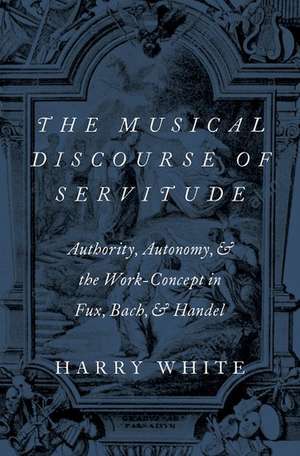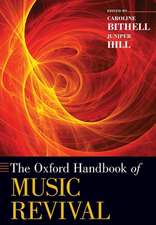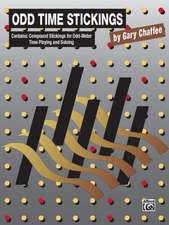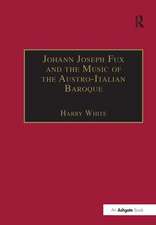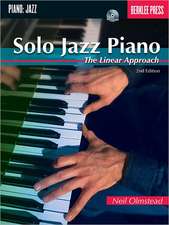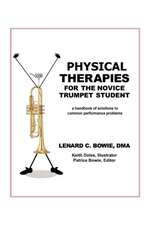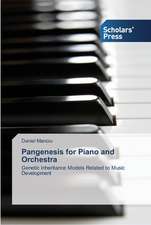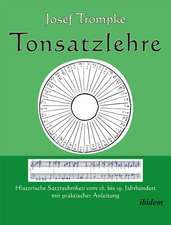The Musical Discourse of Servitude: Authority, Autonomy, and the Work-Concept in Fux, Bach and Handel
Autor Harry Whiteen Limba Engleză Hardback – 5 noi 2020
Preț: 478.92 lei
Preț vechi: 527.21 lei
-9% Nou
Puncte Express: 718
Preț estimativ în valută:
91.66€ • 95.34$ • 76.82£
91.66€ • 95.34$ • 76.82£
Carte disponibilă
Livrare economică 10-15 februarie
Preluare comenzi: 021 569.72.76
Specificații
ISBN-13: 9780190903879
ISBN-10: 0190903872
Pagini: 326
Ilustrații: 56 music examples
Dimensiuni: 241 x 160 x 18 mm
Greutate: 0.45 kg
Editura: Oxford University Press
Colecția OUP USA
Locul publicării:New York, United States
ISBN-10: 0190903872
Pagini: 326
Ilustrații: 56 music examples
Dimensiuni: 241 x 160 x 18 mm
Greutate: 0.45 kg
Editura: Oxford University Press
Colecția OUP USA
Locul publicării:New York, United States
Recenzii
Harry White has the unusual and idiosyncratic ability to link cultural debates about servitude and autonomy to very specific moments in the music of three of the greatest musical figures of the eighteenth century. He not only achieves the seemingly impossible task of integrating J. S. Bach and Handel into one discussion, but goes even further by introducing Fux, a figure who had the tenacity to derive creative capital from the highest degree of musical servitude. We learn about political power, religious prescription, drama, poetry, and the emerging power of autonomous musical works-all articulated with a literary flair that is rare in musicological discourse.
Harry White's new book is a singular achievement, which synthesizes a lifetime's deep engagement with the music of Fux, Bach, and Handel. Its central thesis — that the monarchic indenture of Fux offsets the emerging emancipatory modernity of Bach and Handel — is evidenced by a deft mixture of historical, cultural, and analytical commentary, and underpinned by a commanding knowledge of the long-overlooked legacy of the Austrian Baroque. Ultimately, White makes explicit just how crucial debates about the origins of the modern musical imagination remain. Virtuosic in style and magisterial in scope, this book makes a vital contribution to the cultural study of eighteenth-century music.
White exercises an "autonomy" of thought, but also a "servitude" to both musicology and music.
Harry White's new book is a singular achievement, which synthesizes a lifetime's deep engagement with the music of Fux, Bach, and Handel. Its central thesis — that the monarchic indenture of Fux offsets the emerging emancipatory modernity of Bach and Handel — is evidenced by a deft mixture of historical, cultural, and analytical commentary, and underpinned by a commanding knowledge of the long-overlooked legacy of the Austrian Baroque. Ultimately, White makes explicit just how crucial debates about the origins of the modern musical imagination remain. Virtuosic in style and magisterial in scope, this book makes a vital contribution to the cultural study of eighteenth-century music.
White exercises an "autonomy" of thought, but also a "servitude" to both musicology and music.
Notă biografică
Harry White is Professor of Music at University College Dublin and a Fellow of the Royal Irish Academy of Music. He is widely acclaimed as the foremost cultural historian of music in Ireland.
